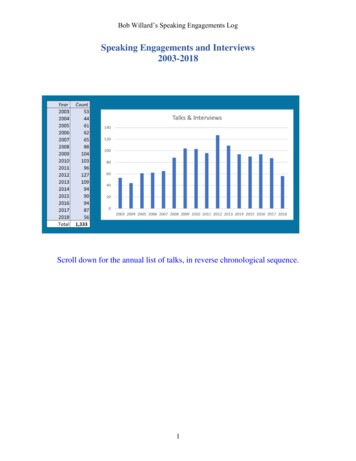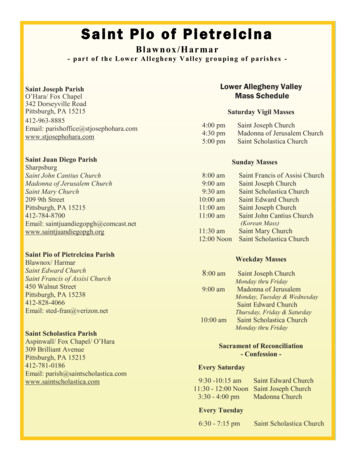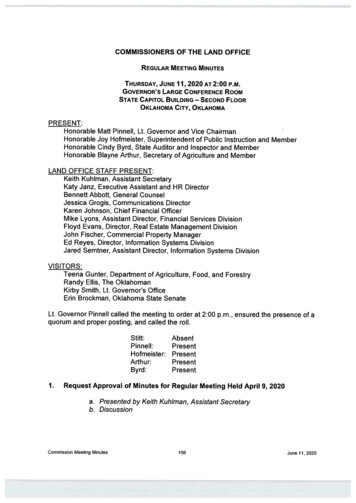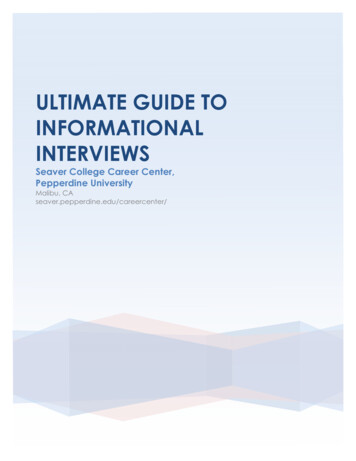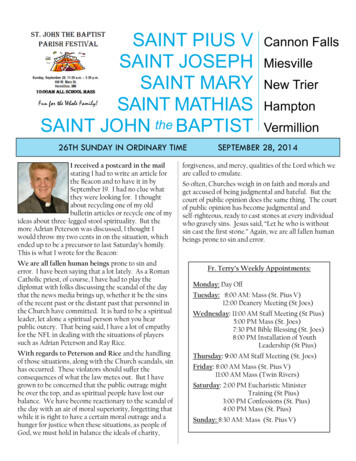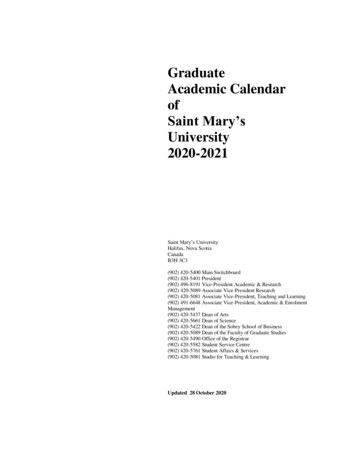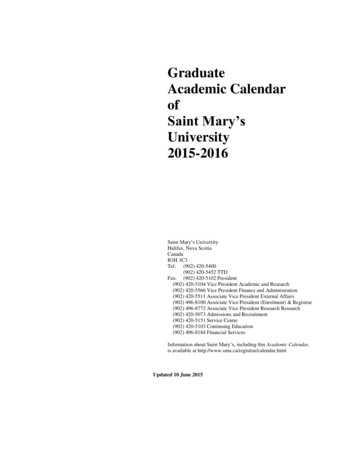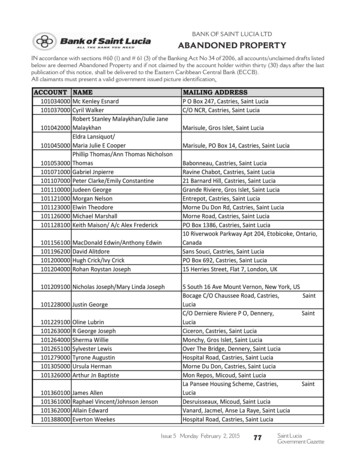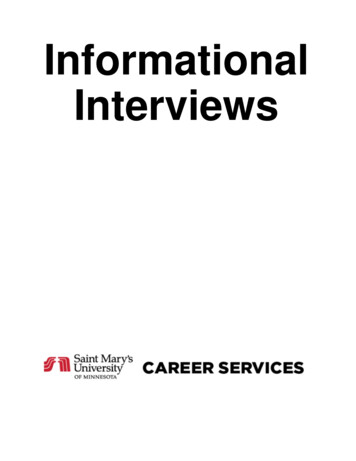
Transcription
InformationalInterviews
Informational InterviewsWhat is an informational interview?An informational interview is a way for you to gain information and advice about a field,industry, or company. It is also one of the most effective ways to grow your network. Aninformational interview consists of a conversation between you and someone in a job orindustry you would like to learn more about. The goals of an informational interview include:o Learning more about a company, industry, and/or persono Introducing yourself to professionals, and industry leaderso Growing your network in an intentional and systematic wayIn short, you will be gathering Advice, Information, and Referrals (A.I.R.). The benefits of sucha strategy are many and varied and include:o Gain self-confidence in talking with professionals, since it is much less stressful thanooooooooooa job interviewObtain information about the job market, the industry and the companies you areinterested inMeet people who are new and interestingBuild a network of contacts which may be helpful in the futureExplore jobs or career paths you did not know existedEnhance your communication skillsImprove your social skillsLearn how to manage a focused conversationObserve various work environmentsLearn which skills are necessary for particular occupationsSharpen your decision-making skillsHow is an informational interview structured?The ideal format for an informational meeting is face-to-face, one-on-one. It is lesseffective and less desirable to conduct informational interviews over the phone or viavideo chatting, email, etc., but better than not conducting one at all.The timeframe for an informational interview can vary widely, but range from 15 minutesto more than an hour.As the job candidate, you are the driving force behind informational interviews. Tasks youwill be responsible for include:o Researching the industry, company, and people to meet witho Initiating contact and asking for the meetingo Conducting the informational interviewo Following-up after each meeting
How do I conduct an informational interview?Below are guidelines to help you before, during, and after each informational interviewBefore:Assess your skills, interests and abilitiesIdentify an industry and/or target companies you'd like to learn more aboutResearch the company using a variety of resources, including: oo Company website, materials, informationo Other sources (glassdoor.com, vault.com, Occupational OutlookHandbook, etc.)o Your networkChoose the kinds of information, advice, and referrals you would like to collect andgenerate a list of questions that will help you gain that information (see list ofsample questions later in this resource)Prepare to dress appropriately, making sure you have the right outfit well beforethe meeting takes placeDevelop your 30 second commercial and practice itFormulate and practice answers to several commonly asked interview questions incase they come up in the informational interviewIdentify (and research) the person/people within the company you would like totalk with and reach out to set up a meeting (see sample script for asking for meetingbelow)Practice informational interviews with someone already in your networkHave someone in your network introduce you or make a referral to a targetedperson, in advance of you reaching out to them if possibleContact the targeted person and include the following key information in your "ask" Your name and your commercial Connections you have in common Ask to meet (be as SPECIFIC as possible in terms of date, time,location, and types of questions you would like to ask). Emphasizethat you are not asking them for a job, but exploring career optionsOnce a meeting is agreed upon, confirm the details, exchange contact information(cell phone numbers) in case something comes up last minute, and say "THANKYOU"Make sure you know exactly where to go and when to meet: show up early to avoidstress and bad impressions.Create the agenda for the meeting, which should include the following elements:o Introduction — using your 30 second commercial — and thank themo Build rapport by talking about common connections, interests, etc.o Re-statement of the purpose of the meeting (gathering information, notasking for a job)o Ask questions to help you gather information, advice and referralso Identify next stepso Say thank you and end the meeting on time
Set a goal of conducting 2-5 informational interviews per weekDuring:Follow the agenda you developed for the meetingMake a strong first impression: show your calm confidence, make eyecontact, shake hands, etc.Ask permission to take notesStart with easy questions, but get to the meaty ones fairly quicklyBring a resume, but only share it if they ask for itWhen appropriate, don't be afraid to "soft sell" yourself by sharing your knowledge,experience, insights, enthusiasmAsk who else they might recommend you talk to in order to learn more about certainthings you coveredAsk permission to stay in touch after the meeting (via email, Linkedln, etc.)After:Within 24 hours, send a thank you note. Thank them for their time and information— make specific reference to topics of interestMake notes of what you learned (helpful and not) and ask yourself how theselearnings may change the ways you think, act, or feel, including what types ofjobs, companies, etc. you might pursue moving forwardFollow-up on any items discussed, especially any people they referred you to.As you complete follow-up tasks, reach back out and update themKeep the connection active by establishing a contact plan (every week, other week,monthly, etc.)
Sample Questions to Ask in an Informational InterviewBelow is a list (adapted from quintcareers.com and other sources) of possible questions toask in an informational interview. Read over the list and identify the questions which wouldmost directly help you gain the information, advice, and referrals to help you succeed in yourcareer development and transition. As you become more comfortable with the informationalinterview process and the jobs you will target, you will likely develop your own sets ofquestions for each interview.Information-based Questionso Is there a basic philosophy of the company or organization and, if so, what is it?(Is it a people-, service-, or product-oriented business?)o What is your job like? A typical day? oooooooooooooWhat do you do? What are the duties/functions/responsibilities of your job?What kinds of problems do you deal with?What kinds of decisions do you make?What percentage of your time is spent doing certain tasks?How does the time use vary? Are there busy and slow times or is the work activityfairly constant?Why did this type of work interest you, and how did you get started?How did you get your job? What jobs and experiences led to your present position?What are the most important personal satisfactions and dissatisfactions connectedwith your occupation? What part of this job do you personally find most satisfying?Most challenging? What do you like and dislike about working in this industry?What are the various jobs in this field or organization?What things did you do before you entered this occupation?What other jobs can you get with the same background?What sorts of changes are occurring in your occupation?What skills are most important for a position in this field?How is the economy affecting this industry?What are the salary ranges for various levels in this field? Is there a salary ceiling?What are the educational requirements for this job? What other types of credentialsor licenses are required? What types of training do companies offer persons enteringthis field? Is graduate school recommended? An MBA? Does the company encourageand pay for employees to pursue graduate degrees?What are the typical entry-level job titles and functions? What entry-level jobs arebest for learning as much as possible?Who is the department head or supervisor for this job? Where do you and yoursupervisor fit into the organizational structure?
Advice-based questionso What is the best way to enter this occupation?- What are the advancement opportunities?-oooooooooooooooooooooooooooWhat are the major qualifications for success in this occupation?What special advice do you have for a student seeking to qualify for this position?How does a person progress in your field? What is a typical career path in this fieldor organization?What were the keys to your career advancement? How did you get where you areand what are your long-range goals?How can I evaluate whether or not I have the necessary skills for a position like yours?If your job progresses as you like, what would be the next step in your career?Are you a member of any professional organizations related to your work? Do yourecommend joining them?Why did you decide to work for this company?What do you like most about this company?Do you find your job exciting or boring? Why?How does your company differ from its competitors?How has your job affected your lifestyle?What are the major frustrations of this job?What interests you least about the job or creates the most stress?Does your work relate to any experiences or studies you had in college?How well did your college experience prepare you for this job?What courses have proved to be the most valuable to you in your work? What wouldyou recommend for me?How important are grades/GPA for obtaining a job in this field?How do you think my university's reputation is viewed when it comes to hiring? Howdo you think graduation from a private (or public) university is viewed when it comesto hiring?From your perspective, what are the problems you see working in this field?If you could do things all over again, would you choose the same path for yourself?Why? What would you change?Do you have any advice for someone interested in this field/job? Are there anywritten materials you suggest I read? Which trade/professional journals andorganizations would help me learn more about this field?What kinds of experience, paid or unpaid, would you encourage for anybodypursuing a career in this field?Do you have any special words of warning or encouragement as a result of yourexperience?These are my strongest assets (skills, areas of knowledge, personality traits andvalues): . Where would they fit in thisfield? Where would they be helpful in this organization? Where might they fit inother fields? Where might they be helpful in other organizations?How would you assess the experience I've had so far in terms of entering this field?[If you feel comfortable and it seems appropriate:] Would you mind taking a look atmy resume?Any other advice or words of wisdom?
Referral-based Questionso I was really interested in the topic you mentioned earlier. Who should I talk with orwhere should I look for more information about it?o Among the people you work with now (or used to work with at company XYZ), is thereanyone else you think would be helpful for me to meet with?o Based on our conversation, do you think I am on the right track? Are there othercompanies/ industries/ questions I should consider?o Is there a job site that would be good for me to add to my list if I wanted to keep myeyes out for jobs here?o One of my target companies is XYZ. Do you know anyone there I should try to reachout to? How would I go about connecting with them?o Who else do you know who is doing similar kinds of work or uses similar skills?o What other kinds of organizations hire people to perform the functions you do here?o Do you know of other people whom I might talk to who have similar jobs?o Any next steps you would suggest for me?Asking for an Informational InterviewTaking the initiative to ask for an informational interview requires some courage, but is agreat way to open a door and introduce yourself to the world of work. To take full advantageof this strategy, when you ask, try to be:o Professional — talk, act, dress and carry yourself not just as if you are a goodstudent, but as if you are a good employeeo Positive — approaching your job search and informational interviews with acalm confidence and the thought, “I can do this and it will make a positivedifference", will carry you through the challenging, uncertain times of thisprocesso Pleasant — smile, shake hands, be your genuinely best self. You will leave along and lasting impression by being the kind of person someone would liketo spend time witho Persuasive — if you want something, you have to convince someone youdeserve it. Persuade people that an informational interview with you wouldbe a positive experience for all involvedo Persistent — you will encounter resistance in this process (you will get some"no's" from people you ask for a meeting), but stay focused on your goals andkeep asking. Every "yes" is a step forward on your career pathThe two most common ways people ask for an informational meeting is via email or viaphone call. Below are sample scripts to get you started, but it is important that youcommunicate using your own voice. Elements of the "ask" include an introduction ofyourself, the reason you are asking to meet and the actual meeting proposal. (Both exampleson the next page are adapted from quintcareers.com)
Sample Email:Dear Mr. Shaneson:[Introduction of self] As a junior at Washington State University, I start my physical therapycourse next semester. [reasons for asking for the meeting] I would love the opportunityto schedule an informational interview with you to learn more about the field, more abouthow you got involved in this career, and the day-to-day activities of a physical therapist.I was fascinated with the approach to physical therapy you describe in your blogpostings on PhysicalTherapyBlog.com, and I felt you would be one of the mostenlightening people in the field I could possibly interview.[Ask] I know you must be quite busy, so I assure you I will be brief taking up no more than 30minutes of your time.I will contact your office next week to inquire about a convenient time for scheduling thisinformational meeting. You can also reach me at 509-555-4876 or atkatie.walton@gmail.com.Thank you very much for considering this request.Sincerely,Jimmy JuniorSample Phone Script"Hi, my name is and I'm a student atUniversity. I got your name from . You're in a line of work I’minterested in, and I was hoping you could help me gain insights into the profession. I'm suremy questions could be answered in a 20-30-minute informational interview.I was wondering if you would be able to meet on (date, time, location) or would there be amore convenient arrangement for you?"If resistance or pushback:"Let me assure you, I am not meeting with you to ask you for a job or anything more thanyour expertise (which has come highly recommended).Yes, I have a resume, but at this point, I am in the information gathering phase of my career""Let me confirm the date, time, and location (any special instructions about parking, access tothe building, where to meet you?). I'd like to share with you my phone number in case anythingshould come up last minute (XXX-XXX-XXXX). Would you be willing to share your number withme if I have any last minute car troubles, etc.?"
The ideal format for an informational meeting is face-to-face, one-on-one. It is less effective and less desirable to conduct informational interviews over the phone or via video chatting, email, etc., but better than not conducting one at all. The timeframe for an informational interview can vary widely, but range from 15 minutes
